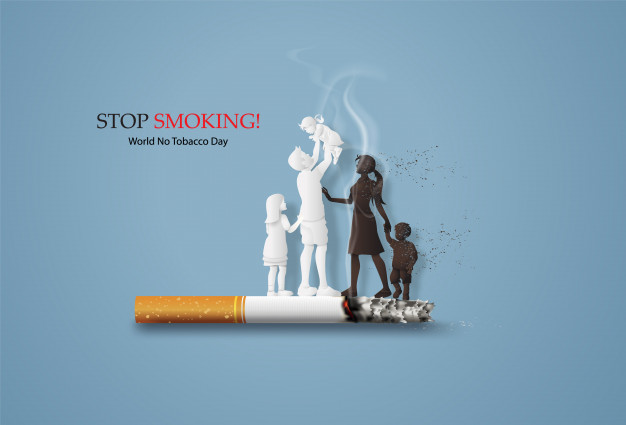World No Tobacco Day
Home » World No Tobacco Day

World No Tobacco Day, May 31 2020, seeks to protect young people from the advertising of major tobacco companies and to help them stop using cigarettes and nicotine. This awareness day will highlight the health problems associated with the use of tobacco and will inspire policymakers to adopt measures that will minimize smoking and usage of other tobacco products.
Tobacco smoke contains many chemical and particulate matter that irritates the airways and lungs. When those substances are inhaled by a smoker, the body tries to get rid of them by making mucus and cough.
How smoking tobacco damages your lungs ?
Smoking affects the airways in the lungs and the tiny air sacs. This damage starts in smokers early on and lung function tends to decline as long as the individual smokes. Nevertheless, the condition can take years to become apparent enough to diagnose lung disease.
Smoking causes pneumonia and asthma. It also induces many other pulmonary diseases and can be almost as severe as lung cancer.
Other ways smoking tobacco affects your health
Not all of the smoking related health conditions result in deaths. Smoking impacts the health of a person in many ways, affecting almost every body organ and causing a lot of illnesses. Here are some examples of other ways cigarette smoking affects your health:
- Increased risk of gum disease and tooth loss.
- Wounds taking longer to heal
- Decreased immune system function
- Increased risk of type 2 diabetes
- Decreased sense of smell and taste
- Premature aging of the skin
- Bad breath and stained teeth
- Increased risk for cataracts (clouding of the lenses of the eyes)
- Lower bone density (thinner bones), which means a higher risk for broken bones, including hip fracture.
- Higher risk of developing rheumatoid arthritis
- Increased risk for age-related macular degeneration, which can cause blindness
- Increased risk of peptic ulcers
Many of the smoking-related health problems can steal a person’s quality of life long before he dies. Smoking-related illness can make breathing, moving around, working or playing more difficult for a person. Quitting smoking can reduce the smoking-related disability, especially at younger ages.

